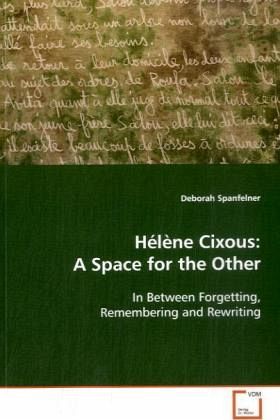
Hélène Cixous: A Space for the Other
In Between Forgetting, Remembering and Rewriting
Versandkostenfrei!
Versandfertig in 6-10 Tagen
39,99 €
inkl. MwSt.

PAYBACK Punkte
20 °P sammeln!
Hélène Cixous: A Space for the Other in BetweenForgetting, Remembering and Rewriting is a study inintertextuality that examines the narrative positionof the Subject in relation to the Other in HélèneCixous s works: Or, les lettres de mon père (1997),Les Rêveries de la femme sauvage: scènes primitives(2000) and her writing on Clarice Lispector. Cixousrewrites the identity of the Subject/Other in such away that the boundaries between the two are blurred.The androgynous nature of the protagonists in herworks subverts the gender binary opposition bringingissues of plurality and culture to t...
Hélène Cixous: A Space for the Other in Between
Forgetting, Remembering and Rewriting is a study in
intertextuality that examines the narrative position
of the Subject in relation to the Other in Hélène
Cixous s works: Or, les lettres de mon père (1997),
Les Rêveries de la femme sauvage: scènes primitives
(2000) and her writing on Clarice Lispector. Cixous
rewrites the identity of the Subject/Other in such a
way that the boundaries between the two are blurred.
The androgynous nature of the protagonists in her
works subverts the gender binary opposition bringing
issues of plurality and culture to the fore in terms
of subject identity. It analyzes the ramifications
that the volatility of the Subject/Other positions
have for elements of autobiographical narrative.
Cixous challenges us to question the role
of the critic. The conclusion speculates on the
possibilities for change in terms of gender norms and
the impact that writing will have in bringing about
systemic changes in society
Forgetting, Remembering and Rewriting is a study in
intertextuality that examines the narrative position
of the Subject in relation to the Other in Hélène
Cixous s works: Or, les lettres de mon père (1997),
Les Rêveries de la femme sauvage: scènes primitives
(2000) and her writing on Clarice Lispector. Cixous
rewrites the identity of the Subject/Other in such a
way that the boundaries between the two are blurred.
The androgynous nature of the protagonists in her
works subverts the gender binary opposition bringing
issues of plurality and culture to the fore in terms
of subject identity. It analyzes the ramifications
that the volatility of the Subject/Other positions
have for elements of autobiographical narrative.
Cixous challenges us to question the role
of the critic. The conclusion speculates on the
possibilities for change in terms of gender norms and
the impact that writing will have in bringing about
systemic changes in society












